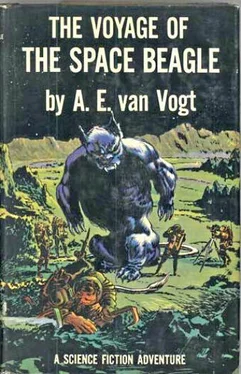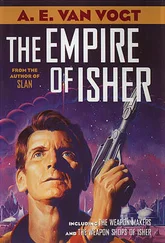Grosvenor worked rapidly, and since he merely put marks on an already printed chart, it was not long before he had his graph. It was an intricate affair. It would not be easy to explain it to someone who was not already familiar with Nexialism. But for him it made a fairly sharp picture. In the emergency it pointed at possibilities and solutions that could not be ignored. So it seemed to Grosvenor.
Under the heading of “General Recommendations,” he wrote, “Any solution adopted should include a safety valve.”
With four copies of the chart, he headed for the mathematics department. There were guards, which was unusual and an obvious protection against the cat. When they refused to let him see Morton, Grosvenor demanded to see one of the Director’s secretaries. A young man emerged finally from another room, politely examined his chart, and said that he would “try to bring it to Director Morton’s attention.”
Grosvenor said in a grim tone, “I’ve been told that kind of thing before. If Director Morton does not see that chart, I shall ask for a Board of Inquiry. There’s something damn funny going on here in connection with the reports I make to the Director’s office, and there’s going to be trouble if there’s any more of it.”
The secretary was five years, older than Grosvenor. He was cool and basically hostile. He bowed, and said with a faintly satirical smile, “The Director is a very busy man. Many departments compete for his attention. Some of them have long histories of achievement, and a prestige that give them precedence over younger sciences and—” he hesitated — “scientists.” He shrugged, “But I shall ask him if he wishes to examine the chart.”
Grosvenor said, “Ask him to read the ‘Recommendations’. There isn’t time for any more.”
The secretary said, “I’ll bring it to his attention.”
Grosvenor headed for Captain Leeth’s quarters. The commander received him and listened to what he had to say. Then he examined the chart. Finally, he shook his head.
“The military,” he said in a formal tone, “has a slightly different approach to these matters. We are prepared to take calculated risks to realize specific goals. Your notion that it would be wiser in the final issue to let this creature escape is quite contrary to my own attitude. Here is an intelligent being that has taken hostile action against an armed ship. That is an intolerable situation. It is my belief that he embarked on such an action knowing the consequences.” He smiled a tight-lipped smile. “The consequences are death.”
It struck Grosvenor that the end result might well be death for people who had inflexible ways of dealing with unusual danger. He parted his lips to protest that he did not intend that the cat should escape. Before he could speak, Captain Leeth climbed to his feet. “I’ll have to ask you to go now,” he said. He spoke to an officer. “Show Mr. Grosvenor the way out.”
Grosvenor said bitterly, “I know the way out.”
Alone in the corridor, he glanced at his watch. It was five minutes to attack time.
Disconsolately, he headed for the bridge. Most of the others were already present as Grosvenor found a seat. A minute later, Director Morton came in with Captain Leeth. And the meeting was called to order.
Nervous and visibly tense, Morton paced back and forth before his audience. His usually sleek black hair was rumpled. The slight pallor of his strong face emphasized rather than detracted from the out-thrust aggressiveness of his jaw. He stopped walking abruptly. His deep voice was crisp to the point of sharpness as he said, “To make sure that our plans are fully co-ordinated, I’m going to ask each expert in turn to outline his part in the over-powering of this creature. Mr. Pennons first!”
Pennons stood up. He was not a big man, yet he looked big, perhaps because of his air of authority. Like the others, his training was specialized, but because of the nature of his field he needed Nexialism far less than anyone else in the room. This man knew engines, and the history of engines. According to his file record — which Grosvenor had examined — he had studied machine development on a hundred planets. There was probably nothing fundamental that he didn’t know about practical engineering. He could have spoken a thousand hours and still only have touched upon his subject.
He said, “We’ve set up a relay in the control room here which will start and stop every engine rhythmically. The trip lever will work a hundred times a second. And the effect will be to create vibrations of many kinds. There is just a possibility that one or more of the machines will shatter, on the same principle as soldiers crossing a bridge in step — you’ve heard that old story, no doubt — but in my opinion there is no real danger of a break from that cause. Our main purpose is simply to interfere with the interference of the creature, and smash through the doors!”
“Gourlay next!” said Morton.
Gourlay climbed lazily to his feet. He looked sleepy, as if he were somewhat bored by the proceedings. Grosvenor suspected that he liked people to think him lackadaisical. His title was chief communications engineer, and his file record chronicled a sustained attempt to acquire knowledge in his chosen field. If his degrees were any evidence, then he had an orthodox educational background second to none. When he finally spoke, he drawled in his unhurried fashion. Grosvenor noticed that his very deliberateness had a soothing effect on the men. Anxious faces relaxed. Bodies leaned back more restfully.
Gourlay said, “We’ve rigged up vibration screens that work on the principle of reflection. Once inside, we’ll use them so that most of the stuff he can send will be reflected right back at him. In addition, we’ve got plenty of spare electric energy that we’ll just feed him from mobile copper cups. There must be a limit to his capacity for handling power with those insulated nerves of his.”
“Selenski!” called Morton.
The chief pilot was standing by the time Grosvenor’s gaze flicked over to him. It was so swiftly done that he seemed to have anticipated Morton’s call. Grosvenor studied him, fascinated. Selenski was a lean-bodied, lean-faced man with startlingly vivid blue eyes. He looked physically strong and capable. According to his file record, he was not a man of great learning. He made up for it in steadiness of nerve, in lightning response to stimuli, and in a capacity for sustained clocklike performance.
He said, “The impression I’ve received of the plan is that it must be cumulative. Just when the creature thinks that he can’t stand any more, another thing happens to add to his trouble and confusion. When the uproar’s at its height, I cut in the anti-acceleration. The Director thinks with Gunlie Lester that this creature will know nothing about anti-acceleration. It’s a development of the science of interstellar flight and wouldn’t have been likely to come about in any other way. We think when the creature feels the first effects of the anti-acceleration — you all remember the caved-in sensation you had the first time it happened to you — it won’t know what to think or do.” He sat down.
Morton said, “Korita next!”
“I can only offer you encouragement,” said the archaeologist, “on the basis of my theory that the monster has all the characteristics of the criminal of the early ages of any civilization. Smith has suggested that his knowledge of science is puzzling. In his opinion, this could mean that we are dealing with an actual inhabitant, and not the descendant of the inhabitants, of the dead city we visited. This would ascribe a virtual immortality to our enemy, a possibility which is partly borne out by his ability to breathe both oxygen and chlorine — or neither. But his immortality in itself would not matter. He comes from a certain age in his civilization; and he has sunk so low that his ideas are mostly memories of that age. In spite of his ability to control energy, he lost his head in the elevator when he first entered the ship. By becoming emotional when Kent offered him food, he placed himself in such a position that he was forced to reveal his special powers against a vibration gun. He bungled the mass murders a few hours ago. As you can see, his record is one of the low cunning of the primitive, egotistical mind, which has little or no understanding of its own body processes in the scientific sense, and scarcely any conception of the vast organization with which it is confronted.
Читать дальше











